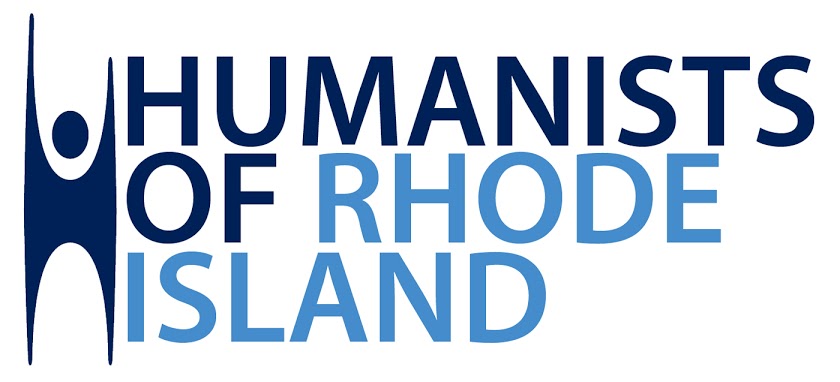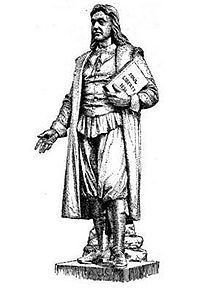by Chuck Flippo
As someone who frequently references Patrick Conley’s historical research, I do not question the particular historical facts he presents in his August 13 Providence Journal editorial “Rhode Island never touted freedom from religion." He is correct that, despite being a bastion of religious tolerance, colonial Rhode Island did not have actual separation of church and state as is often thought. Unfortunately, Conley’s editorial ignores the very lessons one should draw from the historical facts that he has done so much to document. And his final comment, that people standing up for separation of church and state should “not use history to validate your position," is so off the mark as to be an absolute embarrassment to someone with Mr. Conley’s credentials.
Confusion over Rhode Island’s history is perhaps understandable given that the original settlers of Providence signed a document in 1637 agreeing to govern themselves “only in civil things” as opposed to governing religious thought. That sounds a lot like separation of church and state. That agreement, however, was soon supplanted by other governing documents that reflected the philosophies of the much less secular founders of Portsmouth and Newport. The other leaders of colonial Rhode Island did not seem to share Roger Williams’ commitment to the “wall or hedge” of separation.
And Conley is right about the 1663 charter that John Clarke sent back from England. Although it protected the colony’s commitment to religious tolerance, it clearly did not separate government from religion. The charter can indeed be interpreted as suggesting that Rhode Island and Providence Plantations would be a “Christian” colony, albeit one that allowed full freedom for others to worship as they see fit. That failure to separate government and religion would come back to haunt religious minorities for most of the 18th century.
This is where Conley falls down on the job, letting his bias against church-state separation color his argument. His statement that Rhode Island had “more than 300 years of uncontroversial and relatively innocuous contact by religion with the state” is contradicted by the man’s own research! Precisely because Rhode Island did not have that “wall of separation,” the protestant Christians who ran the government actually wrote religious discrimination into the law books.
Conley himself has written about this in his study of the 1719 compilation of Rhode Island laws. The compilation included a provision officially denying the right to vote and hold public office to not only “non-Christians” (meaning primarily the Jewish community of Newport) but to Roman Catholics as well. This prohibition was in place until after American independence. Being denied the right to vote and hold office is hardly “innocuous” if you are one of the people being denied those rights!
The Colony’s government and courts drew on that prohibition to help justify their blatantly discriminatory denial of citizenship to Jewish Newporter Aaron Lopez in1761. Jews were clearly not equal citizens in colonial Rhode Island. But then, at that time, neither were Catholics.
Another member of Newport’s Jewish community, Moses Michael Hays, stood up to the General Assembly and refused to sign an oath of loyalty to the state that had just declared its independence from Britain. He refused not because he was against independence (he wasn’t) but because Rhode Island did not treat him as an equal citizen due to his religion. The treatment that Hays protested in his 1776 public trial was hardly “uncontroversial” and “innocuous”.
Since “liberty of conscience” was protected by the 1663 charter, people were free to practice whatever religion they wanted in colonial Rhode Island. They were also free not to practice any religion at all. Without a wall of separation between church and state, however, the Protestant majority was able to use government to keep religious minorities from enjoying equal civil rights and from having an official voice in the affairs of state. What Rhode Island’s history shows is that religious tolerance alone does not guarantee political rights.
As Conley suggests, Roger Williams believed in church-state separation because he wanted to keep government out of the church. It wasn’t until Thomas Jefferson and other Founding Fathers decided that a truly democratic society needed to keep the church out of government that we started building the current wall of separation. Ensuring that the wall remains in place to guarantee equal rights for all is what the Cranston school banner controversy was all about. (Whether the Woonsocket cross violates the First Amendment is less clear, which is why the Humanists of Rhode Island has not taken a position on that particular matter. Regardless of its First Amendment status, there were a number of legal issues concerning the cross on Pleasant Valley Parkway.)
While Mr. Conley is right to correct the misperception that colonial Rhode Island had separation of church and state, he does a great disservice by dismissing the mixing of government and religion that followed as “uncontroversial” and “innocuous." The historical research to which he has contributed shows the discrimination that results when you do not keep church and state separate.
Mr. Conley admonishes those of us who wish to maintain church-state separation to “not use history to validate [our] position.” If he himself is going to present only half the story - and a biased half at that -- perhaps he should follow his own advice.
Confusion over Rhode Island’s history is perhaps understandable given that the original settlers of Providence signed a document in 1637 agreeing to govern themselves “only in civil things” as opposed to governing religious thought. That sounds a lot like separation of church and state. That agreement, however, was soon supplanted by other governing documents that reflected the philosophies of the much less secular founders of Portsmouth and Newport. The other leaders of colonial Rhode Island did not seem to share Roger Williams’ commitment to the “wall or hedge” of separation.
And Conley is right about the 1663 charter that John Clarke sent back from England. Although it protected the colony’s commitment to religious tolerance, it clearly did not separate government from religion. The charter can indeed be interpreted as suggesting that Rhode Island and Providence Plantations would be a “Christian” colony, albeit one that allowed full freedom for others to worship as they see fit. That failure to separate government and religion would come back to haunt religious minorities for most of the 18th century.
This is where Conley falls down on the job, letting his bias against church-state separation color his argument. His statement that Rhode Island had “more than 300 years of uncontroversial and relatively innocuous contact by religion with the state” is contradicted by the man’s own research! Precisely because Rhode Island did not have that “wall of separation,” the protestant Christians who ran the government actually wrote religious discrimination into the law books.
Conley himself has written about this in his study of the 1719 compilation of Rhode Island laws. The compilation included a provision officially denying the right to vote and hold public office to not only “non-Christians” (meaning primarily the Jewish community of Newport) but to Roman Catholics as well. This prohibition was in place until after American independence. Being denied the right to vote and hold office is hardly “innocuous” if you are one of the people being denied those rights!
The Colony’s government and courts drew on that prohibition to help justify their blatantly discriminatory denial of citizenship to Jewish Newporter Aaron Lopez in1761. Jews were clearly not equal citizens in colonial Rhode Island. But then, at that time, neither were Catholics.
Another member of Newport’s Jewish community, Moses Michael Hays, stood up to the General Assembly and refused to sign an oath of loyalty to the state that had just declared its independence from Britain. He refused not because he was against independence (he wasn’t) but because Rhode Island did not treat him as an equal citizen due to his religion. The treatment that Hays protested in his 1776 public trial was hardly “uncontroversial” and “innocuous”.
Since “liberty of conscience” was protected by the 1663 charter, people were free to practice whatever religion they wanted in colonial Rhode Island. They were also free not to practice any religion at all. Without a wall of separation between church and state, however, the Protestant majority was able to use government to keep religious minorities from enjoying equal civil rights and from having an official voice in the affairs of state. What Rhode Island’s history shows is that religious tolerance alone does not guarantee political rights.
As Conley suggests, Roger Williams believed in church-state separation because he wanted to keep government out of the church. It wasn’t until Thomas Jefferson and other Founding Fathers decided that a truly democratic society needed to keep the church out of government that we started building the current wall of separation. Ensuring that the wall remains in place to guarantee equal rights for all is what the Cranston school banner controversy was all about. (Whether the Woonsocket cross violates the First Amendment is less clear, which is why the Humanists of Rhode Island has not taken a position on that particular matter. Regardless of its First Amendment status, there were a number of legal issues concerning the cross on Pleasant Valley Parkway.)
While Mr. Conley is right to correct the misperception that colonial Rhode Island had separation of church and state, he does a great disservice by dismissing the mixing of government and religion that followed as “uncontroversial” and “innocuous." The historical research to which he has contributed shows the discrimination that results when you do not keep church and state separate.
Mr. Conley admonishes those of us who wish to maintain church-state separation to “not use history to validate [our] position.” If he himself is going to present only half the story - and a biased half at that -- perhaps he should follow his own advice.
Chuck Flippo site manager at Loeb Visitors Center at Touro Synagogue National Historic Site and a board member of the Humanists of Rhode Island. The views expressed are entirely his own and not necessarily those of Loeb Visitors Center at Touro Synagogue National Historic Site.


No comments:
Post a Comment